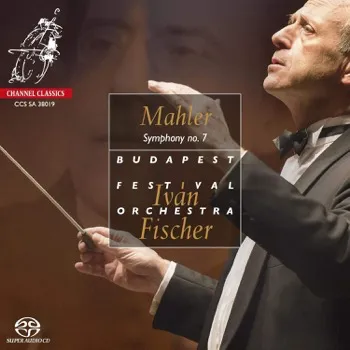Giving the elusive character of Mahler’s Seventh Symphony, it’s very well presented on record. Famous cycles by great Mahler conductors such as Solti, Abbado and Chailly each presented the Seventh as one of the highlights of their perspective cycle. With this new release, Iván Fischer and his Budapest Festival Orchestra have also outdone themselves with their ongoing complete Mahler cycle.

Performing this Symphony well requires a good deal of balancing; Between clarity and muddiness, organization and chaos, stability and instability. The first movement, a well-constructed sonata form, is a good example of the way Fischer manages to find the right spot, so to speak, never forgoing any of the qualities inherited in the score. This movement is clear-headed yet never feels cold to detached, with the high points built with extraordinary control and excitement – hear the superbly executed transition from around 2:30 that leads to the heart-melting second subject coming in at 04:00.
The two “Nachtmusik” movements are brought off with fantastic clarity – You can almost feel the birds coming out of your speakers at 0:45 (track 2), and the unexpected guitar and mandolin on track 4 are a contributing force rather than a mere gimmick. These two movements can sometimes bring a performance to a halt, taking away from the drive and momentum of the first movement, and here, happily, they are no less engaging.
The Scherzo (track 3) is brought off with chilling wit, almost cynical without being grotesque (those glissandi from the first violins or the light waltz accompaniment from the woodwinds).
The finale allows the orchestra to display the greatest technical capabilities as well as their uncanny ability to interact or blend together when called for. Throughout this performance, soloists and groups from this orchestra proving themselves to be among the best ensembles in Europe, and this final Rondo includes too many examples to count, from the solo brass and woodwind breakouts and choral-like blend, to the worm yet clear strings groups or the exemplary procession section.
The recording quality contributes greatly to the experience. We have come to expect good orchestral recordings in recent years, but this one is indeed special in its tremendous sound picture, allowing the smallest details to emerge while preserving the atmospheric resonance of the hall. The quietest and loudest moments are crystalline in equal measure, allowing for an additional enjoinment from this rendition.
Many recordings of well-known pieces take time to sink in and get assessed along with other versions. In this case, this version can already be recognized as one of the better accounts of Mahler’s Seventh, to stand among other distinguished versions by a darker, almost frightening Chailly, the energetic and direct Solti or the serious, almost bombastic Klemperer. Fischer brings something entirely fresh – humane, loving performance that somehow untangles this entwined Symphony, making it a little more approachable. Highly recommended.
Mahler – Symphony No. 7
Budapest Symphony orchestra
Iván Fischer – Conductor
Channel Classics, CD 38019




















